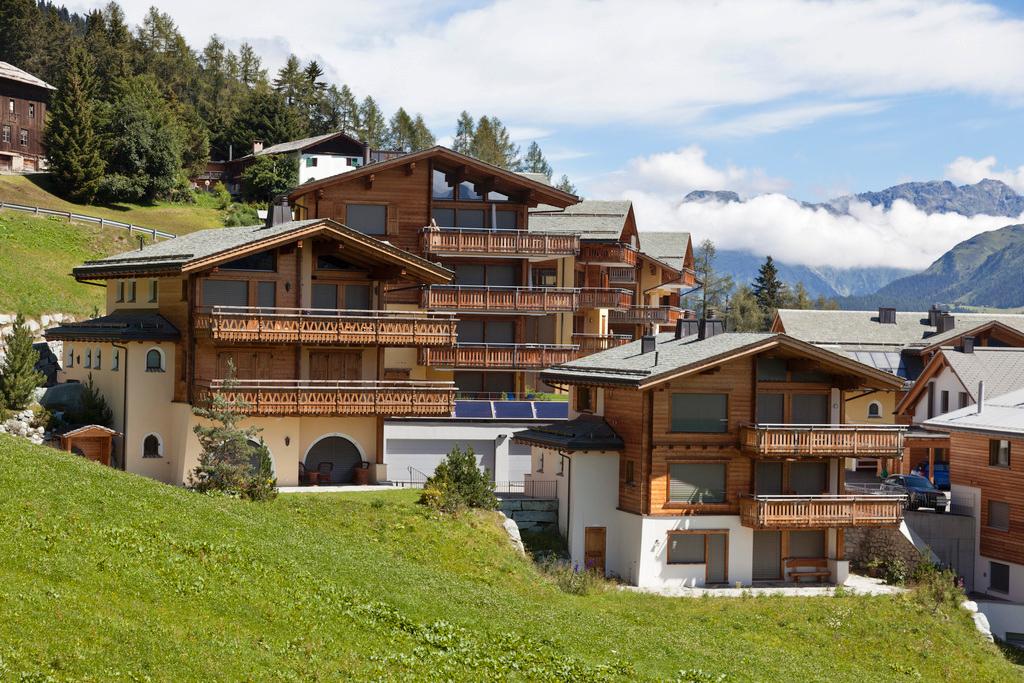A quarter of Swiss have multiple residences

More than a quarter of the Swiss population now lives regularly in more than one place, reflecting changes in society and the adoption of a more “nomadic” lifestyle.
A recurring debate over second homes reminds us that a certain number of Swiss share their time between several places. What is surprising is to see how widespread the phenomenon is.
A recent study by federal technology institute ETH Zurich’s research centre WohnforumExternal link, the University of Basel and the Lucerne University of Applied Sciences and Arts has established that 28% of Swiss currently live in more than one place, with an additional 20% having done so at least once before.
Of those residing in several places, 9% said they had four or more addresses.
“This can seem surprising, but you get to that number easily,” sociologist Cédric Duchêne-Lacroix, who co-authored of the study, said. “For instance, I met a young woman who lives in Bern for her apprenticeship but who also lives regularly at the separate homes of her father, mother and boyfriend.”
He was nonetheless surprised at the extent of the phenomenon, also known as multi-locality.
“We knew that 8% of people had second homes. We expected that adding those with multi-local living arrangements would easily bring this proportion to over 15%. We would never have imagined that it would reach 28%.”
Society in transformation
Many reasons explain why more than a quarter of Swiss want or need to live in several places. Leisure topped the list of reasons people gave (68% of multi-home residents), while only 15% said work had them living in more than one place.
This does not mean that leisure activities are the deciding factor, however. According to Duchêne-Lacroix, “leisure activities seem the most important mainly because the other reasons are cited less frequently. Respondents could give several motives but leisure activities were mentioned for all residences while other activities were limited to just one place”.
The study’s data also showed that 15- to 24-year-olds were the most likely to live in multiple locations. Secondary schooling and university studies, having to live with parents separately or sharing accommodations with partners or other people are some of the reason why they stay at different addresses.
Marital status also had an effect on multi-locality. Singles (36.5%) as well as divorced people (34.4%) are much more likely to live at multiple addresses than those who are married (22%). Children living under the joint custody of divorced parents would also divide their time between several locations.
The way people live is therefore a reflection of society, Duchêne-Lacroix says. “Behind the practice of living at multiple locations, we can see the transformation of society. Clearly, the phenomenon has always existed, but in the past it was much less widespread and living arrangements were more traditional. Multi-locality relating to work was not the same as it is today. It used to exist, for example, in alpine pastures, but that way of life has practically gone. It also reflects changes in family life.”
Admin issues
swissinfo.ch met a couple living in multi-local arrangements. The wife works in Zurich, keeping a small apartment there, while her husband, a stay-at-home father, lives in Neuchâtel together with their two-and-a-half-year-old daughter.
“My wife could not carry out her profession in Neuchâtel, so she has to stay in Zurich,” explained Pierre-François Besson.
“It’s also a way of bridging two linguistic regions, which prevents you from getting into a rut. Also, my in-laws live in Zurich. Having a base in both places makes it possible to have a more informal family life. And then it’s simply refreshing to not always have to stay in the same place.”
For this couple the formula worked perfectly, apart from a few drawbacks. “Financially, it does of course cost a bit more,” Besson explained, adding that there were also some administrative issues that had to be dealt with.
“Each year, my wife has to explain to the Zurich tax authorities that we really live in Neuchâtel, where we pay our taxes. You also need to think more about certain everyday details, like having enough clothes in each place. But ultimately all that is not a big deal.”
‘Complicated equation’
While the study concluded that multi-local living has become a “mass” phenomenon, the question emerges whether it could be considered unethical to have multiple addresses at a time when certain regions in Switzerland face a chronic housing shortage, with real estate prices remaining high.
“We can’t look at it from the point of view of right or wrong. The equation is much more complicated as there are so many parameters,” Duchêne-Lacroix said.
“Certainly, one can consider for example that a person who occupies an apartment in another city for professional reasons is taking up space. But equally, this same person consumes less on transport than if he or she had to commute daily between two big cities.”
The study
“Multi-local Living Arrangements in Switzerland” is a study funded by the Swiss National Science Foundation.
Research was conducted between 2012 and 2015 by ETH Zurich (ETH Wohnforum), the University of Basel (Institute of Sociology) and the Lucerne University of Applied Sciences and Arts (economics department).
The study was based on a representative sample of 3,246 people ranging from 15 to 74 years old.
(Translated from French by Julia Bassam)

In compliance with the JTI standards
More: SWI swissinfo.ch certified by the Journalism Trust Initiative

You can find an overview of ongoing debates with our journalists here. Please join us!
If you want to start a conversation about a topic raised in this article or want to report factual errors, email us at english@swissinfo.ch.